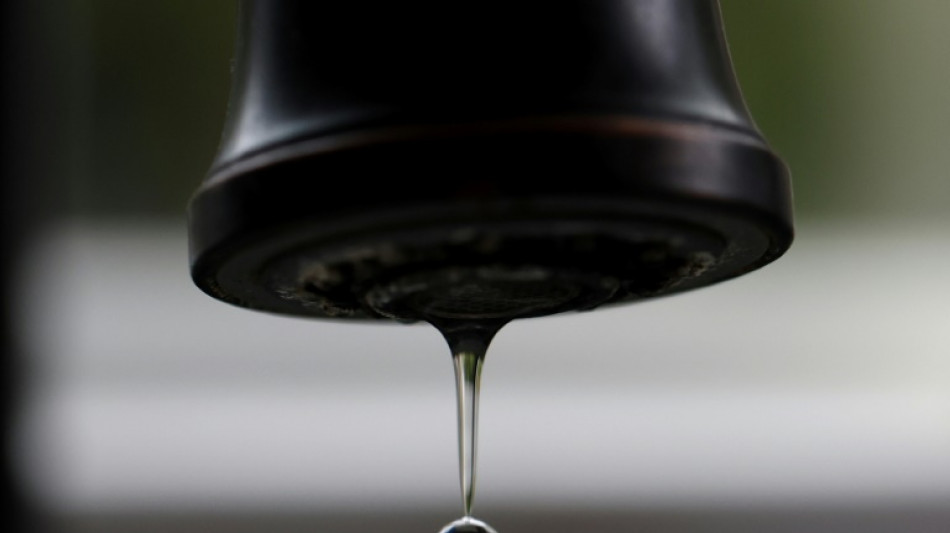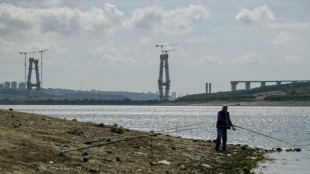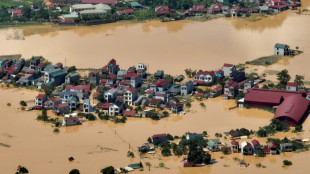
-
 De Minaur, Auger-Aliassime through to Shanghai quarter-finals
De Minaur, Auger-Aliassime through to Shanghai quarter-finals
-
Canal Istanbul stirs fear and uncertainty in nearby villages

-
 Root backs England to end Ashes drought in Australia
Root backs England to end Ashes drought in Australia
-
British PM Starmer hails India opportunities after trade deal

-
 England captain Kane could miss Wales friendly
England captain Kane could miss Wales friendly
-
Tennis increases support for players under corruption, doping investigation

-
 Russia says momentum from Putin-Trump meeting 'gone'
Russia says momentum from Putin-Trump meeting 'gone'
-
EU wants key sectors to use made-in-Europe AI

-
 De Minaur, Rinderknech through to Shanghai quarter-finals
De Minaur, Rinderknech through to Shanghai quarter-finals
-
Gisele Pelicot says 'never' gave consent to accused rapist

-
 Thousands stranded as record floods submerge Vietnam streets
Thousands stranded as record floods submerge Vietnam streets
-
Sabalenka battles to keep Wuhan record alive, Pegula survives marathon

-
 Trio wins chemistry Nobel for new form of molecular architecture
Trio wins chemistry Nobel for new form of molecular architecture
-
Tarnished image and cheating claims in Malaysia football scandal

-
 Family affair as Rinderknech joins Vacherot in Shanghai quarters
Family affair as Rinderknech joins Vacherot in Shanghai quarters
-
New documentary shows life in Gaza for AFP journalists

-
 Tennis stars suffer, wilt and quit in 'brutal' China heat
Tennis stars suffer, wilt and quit in 'brutal' China heat
-
Wildlife flee as floods swamp Indian parks

-
 Record flooding hits Vietnam city, eight killed in north
Record flooding hits Vietnam city, eight killed in north
-
Battling cancer made Vendee Globe win 'more complicated', says skipper Dalin

-
 England, Portugal, Norway closing in on 2026 World Cup
England, Portugal, Norway closing in on 2026 World Cup
-
Child protection vs privacy: decision time for EU

-
 Bear injures two in Japan supermarket, man killed in separate attack
Bear injures two in Japan supermarket, man killed in separate attack
-
In Simandou mountains, Guinea prepares to cash in on iron ore

-
 Morikawa says not to blame for 'rude' Ryder Cup fans
Morikawa says not to blame for 'rude' Ryder Cup fans
-
Far right harvests votes as climate rules roil rural Spain

-
 'Return to elegance': highlights from Paris Fashion Week
'Return to elegance': highlights from Paris Fashion Week
-
Britain's storied Conservative party faces uncertain future

-
 New Zealand's seas warming faster than global average: report
New Zealand's seas warming faster than global average: report
-
Snakebite surge as Bangladesh hit by record rains

-
 Yankees deny Blue Jays playoff sweep as Mariners beat Tigers
Yankees deny Blue Jays playoff sweep as Mariners beat Tigers
-
Australia police foil 'kill team' gang hit near daycare centre

-
 US, Qatar, Turkey to join third day of Gaza peace talks in Egypt
US, Qatar, Turkey to join third day of Gaza peace talks in Egypt
-
Gold tops $4,000 for first time as traders pile into safe haven

-
 Indian garment exporters reel under US tariffs
Indian garment exporters reel under US tariffs
-
NBA back in China after six-year absence sparked by democracy tweet

-
 Energy storage and new materials eyed for chemistry Nobel
Energy storage and new materials eyed for chemistry Nobel
-
Trump unlikely to win Nobel Peace Prize, but who will?

-
 Qatar, Turkey to join third day of Gaza peace talks in Egypt
Qatar, Turkey to join third day of Gaza peace talks in Egypt
-
Study finds women have higher genetic risk of depression

-
 Dolly Parton's sister calls for fan prayers over health issues
Dolly Parton's sister calls for fan prayers over health issues
-
On Trump's orders, 200 troops from Texas arrive in Illinois

-
 Two bodies found, two missing after Madrid building collapse
Two bodies found, two missing after Madrid building collapse
-
Panthers raise banner as NHL three-peat bid opens with win

-
 Nobel physics laureate says Trump cuts will 'cripple' US research
Nobel physics laureate says Trump cuts will 'cripple' US research
-
UFC star McGregor suspended 18 months over missed drug tests

-
 Trump talks up Canada trade deal chances with 'world-class' Carney
Trump talks up Canada trade deal chances with 'world-class' Carney
-
Ecuador president unharmed after apparent gun attack on motorcade

-
 Lyon exact revenge on Arsenal, Barca thrash Bayern in women's Champions League
Lyon exact revenge on Arsenal, Barca thrash Bayern in women's Champions League
-
Trump says 'real chance' to end Gaza war as Israel marks attacks anniversary


Trump admin axes safeguards against 'forever chemicals' in drinking water
President Donald Trump's administration on Wednesday moved to scrap limits on several toxic "forever chemicals" in drinking water, reversing what had been hailed as a landmark public health victory.
The Environmental Protection Agency said it would retain maximum contaminant levels for just two of the most notorious compounds from the so-called PFAS class of chemicals, while removing limits for four others known to cause harm.
At least 158 million people across the United States have drinking water contaminated with per- and polyfluoroalkyl substances, which accumulate in the body and have been linked to cancers, birth defects, decreased fertility and behavioral disorders even at very low levels.
The original rules, imposed by then president Joe Biden's administration in April 2024, were celebrated as a long-overdue response to decades of industry deception and government inaction.
But under the changes announced by EPA Administrator Lee Zeldin, the limits would now apply only to PFOA and PFOS -- two legacy chemicals historically used in products such as nonstick Teflon pans, fabric protectors like 3M's Scotchgard, and firefighting foams -- while exempting newer-generation PFAS developed as replacements.
The EPA would also extend the compliance deadline for these two chemicals from 2029 to 2031, and stop the agency from assessing cumulative risks from mixtures of PFAS chemicals.
"We are on a path to uphold the agency's nationwide standards to protect Americans from PFOA and PFOS in their water," said Zeldin. "At the same time, we will work to provide common-sense flexibility in the form of additional time for compliance."
The move -- part of a broader deregulatory push under Zeldin, who has recast his agency's role as prioritizing the "unleashing" of American industry over environmental stewardship -- was welcomed by water utilities but sharply criticized by advocacy groups.
"This is a huge step backwards, and it's really a betrayal of the promise this administration made to provide clean drinking water and clean air, and to make America healthy again," Melanie Benesh of the nonprofit Environmental Working Group told AFP.
"With a stroke of the pen, the EPA is making a mockery of the Trump administration's promise to deliver clean water for Americans," added Eric Olson and Anna Reade of the Natural Resources Defense Council.
Benesh noted that the excluded chemicals were developed as substitutes, but the EPA's own research has linked some of them -- including GenX, which contaminated a swath of North Carolina's water supply -- to harm to the liver, kidneys, immune system, fetal development, and cancer.
- Planet-wide contamination -
PFAS earned the nickname "forever chemicals" because they can take millions of years to break down in the environment.
First synthesized in the 1930s, PFAS contain carbon-fluorine bonds -- the strongest in chemistry -- giving them extraordinary heat resistance and liquid-repellent properties. Today, they blanket the planet, from the Tibetan Plateau to the ocean floor, and circulate in the blood of nearly every American.
Internal documents cited by researchers show that manufacturers such as DuPont and 3M knew for decades about PFAS dangers yet worked to cloud the science and delay regulation.
In recent years, companies have paid billions of dollars to settle lawsuits with water utilities and affected communities -- even as next‑generation PFAS continue to appear in clothing, cookware, and cosmetics.
Water systems will eventually have to install granular-activated carbon systems, but the newer-generation PFAS, which have shorter molecular chains, clog filters more quickly, raising operating costs.
"This commonsense decision provides the additional time that water system managers need to identify affordable treatment technologies and make sure they are on a sustainable path to compliance," said National Rural Water Association CEO Matthew Holmes, welcoming the delay.
The rollback is likely to face legal challenges. Under the Safe Drinking Water Act, any change to existing standards must be equally or more protective of health.
Activists are also calling on states -- which are free to set stricter standards -- to step in and fill the gap left by federal inaction.
N.Schaad--VB




